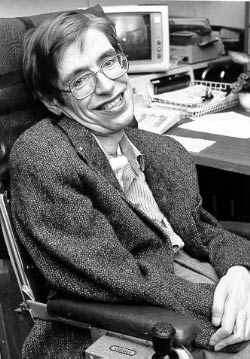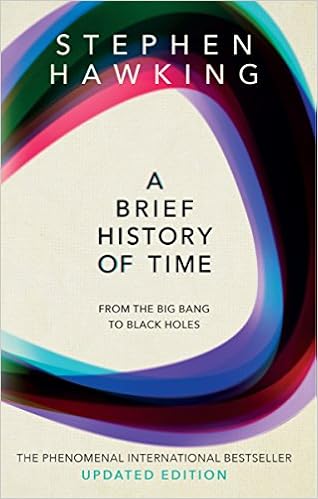Stephen Hawking Biography

Early life Stephen Hawking
Stephen William Hawking was born on 8 January 1942 in Oxford, England. His family had moved to Oxford to escape the threat of V2 rockets over London. As a child, he showed prodigious talent and unorthodox study methods. On leaving school, he got a place at University College, Oxford University where he studied Physics. His physics tutor at Oxford, Robert Berman, later said that Stephen Hawking was an extraordinary student. He used few books and made no notes, but could of work out theorems and solutions in a way other students couldn’t.
“My goal is simple. It is a complete understanding of the universe, why it is as it is and why it exists at all.”
– Stephen Hawking’s Universe (1985) by John Boslough, Ch. 7

It was in Cambridge that Stephen Hawking first started to develop symptoms of neuro-muscular problems – a type of motor neuron disease. This quickly started to hamper his physical movements. His speech became slurred, and he became unable to even to feed himself. At one stage, the doctors gave him a lifespan of three years. However, the progress of the disease slowed down, and he has managed to overcome his severe disability to continue his research and active public engagements. At Cambridge, a fellow scientist developed a synthetic speech device which enabled him to speak by using touchpad. This early synthetic speech sound has become the ‘voice’ of Stephen Hawking, and as a result, he has kept the original sound of this early model – despite technological advancements.
Nevertheless, despite the latest technology, it can still be a time-consuming process for him to communicate. Stephen Hawking has taken pragmatic view to his disability:
“It is a waste of time to be angry about my disability. One has to get on with life and I haven’t done badly. People won’t have time for you if you are always angry or complaining. ” The Guardian (27 September 2005)
Stephen Hawking’s principal fields of research have been involved in theoretical cosmology and quantum gravity.
Amongst many other achievements, he developed a mathematical model for Albert Einstein’s General Theory of Relativity. He has also undertaken a lot of work on the nature of the Universe, The Big Bang and Black Holes.
In 1974, he outlined his theory that black holes leak energy and fade away to nothing. This became known as “Hawking radiation” in 1974. With mathematicians Roger Penrose he demonstrated that Einstein’s General Theory of Relativity implies space and time would have a beginning in the Big Bang and an end in black holes.
Despite being one of the best physicists of his generation, he has also been able to translate difficult physics models into a general understanding for the general public. His books – A Brief History of Time and The Universe in A Nutshell have both became runaway bestsellers – with a Brief History of Time staying in the Bestsellers lists for over 230 weeks and selling over 10 million copies. In his books, Hawking tries to explain scientific concepts in everyday language and give an overview to the workings behind the cosmos.
“The whole history of science has been the gradual realization that events do not happen in an arbitrary manner, but that they reflect a certain underlying order, which may or may not be divinely inspired.”
– A Brief History Of Time (1998) ch. 8
Stephen Hawking has become one of the most famous scientists of his generation. He makes frequent public engagements and his portrayed himself in popular media culture from programmes, such as The Simpsons to Star Trek.
Hawking had the capacity to relate the most complex physics to relateable incidents in everyday life.
“The message of this lecture is that black holes ain’t as black as they are painted. They are not the eternal prisons they were once thought.
Things can get out of a black hole both on the outside and possibly to another universe. So if you feel you are in a black hole, don’t give up – there’s a way out.”
Stephen Hawking. 7 January 2016 – Reith lecture at the Royal Institute in London.
In the late 1990s, he was reportedly offered a knighthood, but 10 years later revealed he had turned it down over issues with the government’s funding for science
He married Jane Wilde, a language student in 1965. He said this was a real turning point for him at a time when he was fatalistic because of his illness. They later divorced but had three children.
Stephen Hawking passed away on 14 March 2018 at his home in Cambridge.
Citation: Pettinger, Tejvan. “Biography of Stephen Hawking”, Oxford, UK – www.biographyonline.net. Last updated 15 January 2018.
A Brief History Of Time
A Brief History Of Time by Stephen Hawking at Amazon
Quotes of Stephen Hawking
“If we do discover a complete theory, it should in time be understandable in broad principle by everyone, not just a few scientists. Then we shall all, philosophers, scientists, and just ordinary people, be able to take part in the discussion of the question of why it is that we and the universe exist. If we find the answer to that, it would be the ultimate triumph of human reason — for then we would know the mind of God.”
– Black Holes and Baby Universes and Other Essays (1993)
“Even if there is only one possible unified theory, it is just a set of rules and equations. What is it that breathes fire into the equations and makes a universe for them to describe? The usual approach of science of constructing a mathematical model cannot answer the questions of why there should be a universe for the model to describe. Why does the universe go to all the bother of existing?”
– A Brief History of Time (1988)
“One, remember to look up at the stars and not down at your feet. Two, never give up work. Work gives you meaning and purpose and life is empty without it. Three, if you are lucky enough to find love, remember it is there and don’t throw it away.”
– Stephen Hawking
“For millions of years, mankind lived just like the animals. Then something happened which unleashed the power of our imagination. We learned to talk and we learned to listen. Speech has allowed the communication of ideas, enabling human beings to work together to build the impossible. Mankind’s greatest achievements have come about by talking, and its greatest failures by not talking. It doesn’t have to be like this. Our greatest hopes could become reality in the future. With the technology at our disposal, the possibilities are unbounded. All we need to do is make sure we keep talking.”

No comments:
Post a Comment